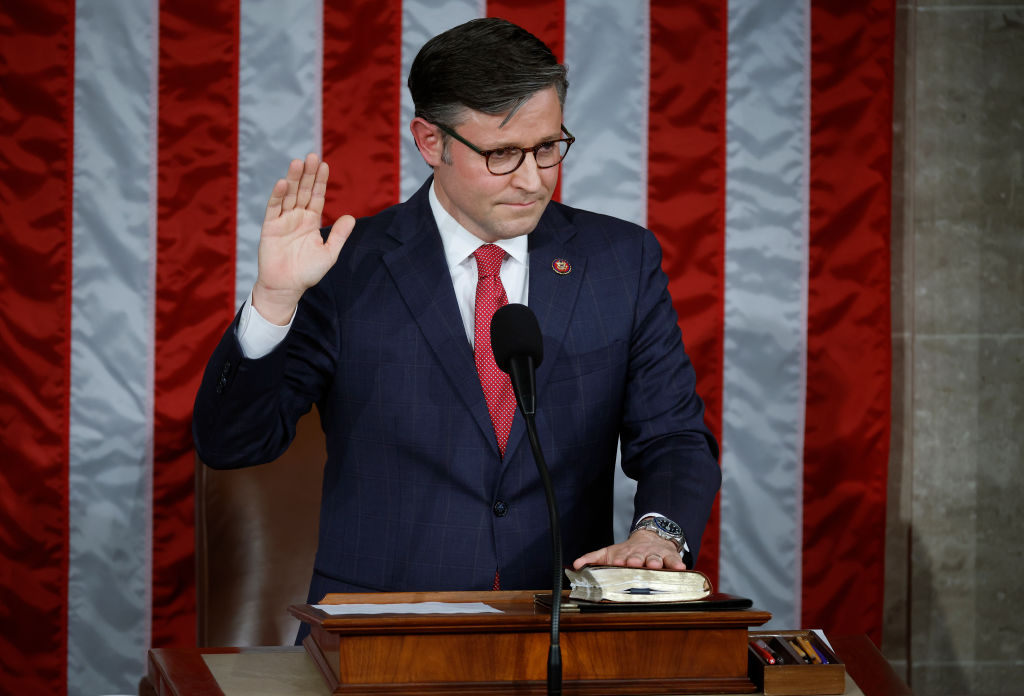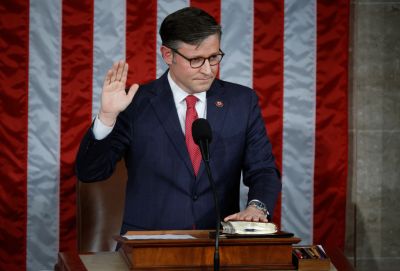When Republicans rallied behind Rep. Mike Johnson and unanimously elected him the 56th speaker of the House of Representatives Wednesday, the Louisiana lawmaker moved from a position of relative obscurity to the highest-ranking Republican in government.
Others will no doubt speculate on what Johnson’s leadership will mean for the prospect of a government shutdown, fights over the debt ceiling, continued funding to Ukraine, and the state of (dis)unity in the Republican Party. But what shouldn’t be overlooked is Johnson’s previous work with the Christian legal powerhouse Alliance Defending Freedom (ADF), and what this can tell us about the man now second in line for the presidency.
ADF was founded in 1993 with support and coordination from several important figures in the evangelical Christian world, including Focus on the Family’s James Dobson and Campus Crusade for Christ’s Bill Bright. It was initially designed to be a funding source for attorneys waging legal battles against abortion and LGBT rights and in favor of strengthening religious freedom protections. In the early 2000s, though, ADF transitioned to direct litigation, hiring attorneys and starting to defend clients of its own.
Two decades later, ADF is the cream of the crop of the Christian legal movement, a network of legal interest groups and law schools focused on promoting goals aligned with the conservative Christian community. This movement includes groups like First Liberty Institute and the American Center for Law and Justice—each of which has argued and won cases before the U.S. Supreme Court—and law schools at universities founded by Christian right stalwarts Pat Robertson (Regent University) and Jerry Falwell (Liberty University).
But with its annual revenue recently topping $100 million, ADF is in a class by itself. It employs a stable of dozens of full-time attorneys and maintains a network of thousands of “allied” attorneys. It has invested in professional communications and fundraising structures. Its Blackstone Legal Fellowship program trains and supports elite law students and graduates, helping to develop the next generation of sympathetic Christian attorneys.
And this is to say nothing of ADF’s impressive legal record. It has averaged about a win per year at the Supreme Court over the past decade, including victories in Masterpiece Cakeshop, Trinity Lutheran v. Comer, and Town of Greece v. Galloway—all cases involving First Amendment issues like speech and religious freedom. Sometimes ADF relies on seasoned litigators (including former U.S. Solicitor General Paul Clement) to assist in these cases, but in others they rely on in-house lawyers like Kristen Waggoner and David Cortman.
Mike Johnson, who earned undergraduate and law degrees from Louisiana State University, was among the first generation of ADF’s full-time lawyers. He appears in ADF press releases as early as 2003, and was identified as “senior legal counsel” in cases about prayer in public schools and city government meetings. He also coordinated with ADF in lawsuits challenging the Affordable Care Act (ACA), this time as dean of the law school at what was then Louisiana College.
Johnson’s rise from first-term congressman to speaker of the House in just six years is nothing less than meteoric. He was first elected to the Louisiana House of Representatives in 2015, and announced his candidacy for a seat in Congress less than a year later. In his three terms in Washington, Johnson has been a reliable vote for Republican-backed policies, including tax cuts and repealing the ACA. He caucused with and eventually chaired the Republican Study Committee, perhaps the signal of conservative commitments in the House.
Critics have noted Johnson’s work defending former President Donald Trump in his impeachment trials. More troubling were Johnson’s efforts to reject the results of the 2020 presidential election. He strategized and organized his colleagues’ support for legal briefs challenging state election certifications, and he was among the majority of Republicans who voted against certifying the Electoral College results and opposed the creation of the January 6 commission, making him one of Trump’s most savvy defenders.
Though he worked hard to defend Trump, who himself has shown wavering commitment to issues social conservatives care about, Johnson’s legal work on abortion, marriage, and religious freedom make him the most socially conservative speaker in American history. And yet it remains to be seen what Johnson’s tenure with ADF will mean for his tenure as House speaker. Johnson’s attention will need to be far more focused on leading a fractured Republican Party than micromanaging the sort of agenda that, to this point, has been central to his career.
Even so, it is impossible to ignore the role that ADF has played in Johnson’s legal and political formation. Media outlets were quick to highlight some of Johnson’s early-2000s rhetoric against homosexuality, which he described as “unnatural” and “bizarre.” And while Johnson is unlikely to play up these sorts of details in the weeks ahead, it would be a mistake to say that his association with ADF was fleeting. Johnson is, by any account, a true believer in ADF’s vision for law and American culture: “religious freedom, free speech, the sanctity of life, parental rights, and God's design for marriage and family.”
It has been 30 years since a group of evangelical elites founded ADF to be a counterweight to more liberal groups like the ACLU, which ADF founding president Alan Sears once said is committed to “eliminating the freedoms of millions of Americans.” And if the past few years are any indication, this investment is paying off handsomely. With a solid majority on the Supreme Court—including Justice Amy Coney Barrett, herself once a contributor to ADF’s Blackstone program—and a former employee now the speaker of the House, ADF’s influence on American law and politics could not be greater.






Please note that we at The Dispatch hold ourselves, our work, and our commenters to a higher standard than other places on the internet. We welcome comments that foster genuine debate or discussion—including comments critical of us or our work—but responses that include ad hominem attacks on fellow Dispatch members or are intended to stoke fear and anger may be moderated.
With your membership, you only have the ability to comment on The Morning Dispatch articles. Consider upgrading to join the conversation everywhere.